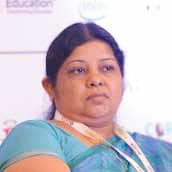
Elizabeth Shirley,
Director, IIITM, Kerala
Technology has to be such that it is understood by all rural and urban students
ICT has led to the development of many impressive tools for improvement in the quality of education. The concept of e-learning is already taking root, but it is not wholly successful. Our country’s educators and professors face a challenge in changing the mindset of people towards ICT.
The curriculum has remained the same over the years, but the transformation has happened in the learning methods of education. India is a developing country, but to develop into a superpower, we need to have a world class education system. To strengthen the education of our country we have to invest in research. The faculty has time only for examinations and evaluation of answer sheets, but no time is given to them for research. Educators and policy makers have to think out of the box and transform the conventional education system.
Our system of education must reach out to all the 700 billion people in India, both in urban and rural areas. ICT plays an important role in this endeavour. There are a number of ICT tools and products, but their ultimate success rests on the simplicity of their design and also on the IT literacy of the students in rural and urban areas.
India has a shortage of 5 lakh skilled workers and to address this problem, adaptive web based education system has to be implemented.
This is activity based learning and focus shifts from static to active learning. To further change the style of education, multimedia and assistive technology has to be adopted for better learning. All children play video games. We have to devote ourselves to designing computer games which help the child learn while playing. Digital learning with different levels has to be built in the games, so that the child can learn according to his capability.
A number of changes have to be made in our education system to make it efficient and effective for India to become a super power.
























